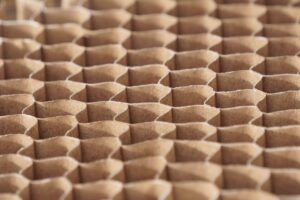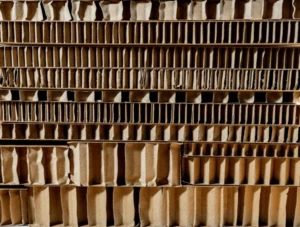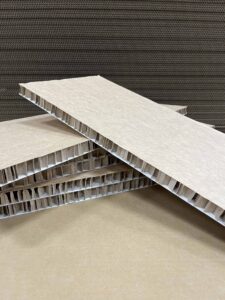Recently, companies have been paying more attention to reducing their ecological footprint through the choice of environmentally friendly packaging materials. One such material that has gained popularity worldwide in recent years is honeycomb cardboard In this post, we will explore the advantages and disadvantages of honeycomb cardboard and styrofoam, highlighting which material to prefer for packaging.
What is honeycomb cardboard?
Honeycomb is made from kraft paper that is formed into hexagonal cells and then glued together to form a rigid board. The honeycomb core is sandwiched between two thin papers, creating a strong structure. Imagine a honeycomb built by bees, where they store honey, pollen, and larvae – the comb structure closely resembles that of honeycomb cardboard.

Sustainability
Honeycomb is a biodegradable material made from recycled paper, and only natural adhesives are used in its production. This ensures a 100% organic end product, free of toxic substances. In contrast, styrofoam uses petroleum-based materials that are energy-intensive to produce and take thousands of years to degrade.
Durability and Lightness
Honeycomb cardboard is incredibly lightweight, yet at the same time, extremely strong. It is one of the most durable packaging materials, allowing products to be transported without excessive weight gain. The strength of honeycomb cardboard depends on the density of cells – the denser the cells, the stronger the honeycomb cardboard. The strongest honeycomb cardboard can withstand a load of up to 800 kg/m2. Styrofoam tends to be less durable, especially under heavy loads.
Customizability
Honeycomb cardboard can be customized according to the needs of different products and brands. We have both white and brown honeycomb cardboard in our selection, which we can cut to exactly the size that suits you. However, styrofoam tends to have more limited adaptability compared to honeycomb.

| Feature | Honeycomb cardboard | Styrofoam |
| Environmental friendliness | Biodegradable, recycled paper, only natural glues used | Petroleum-based, non-biodegradable |
| Durability and lightness | Incredibly light, yet very strong, resistant to loads of up to 800 kg/m² | Tends to be less durable, especially under heavy loads |
| Customizability | Can be customized according to the needs of different products and brands. There is a choice of white and brown honeycomb cardboard | Limited selection compared to honeycomb |
| Areas of use | Packaging, interior design, advertising materials | Mainly packaging |
| CO2 footprint | Low | High |
| Degradation time | Biodegradable, breaks down quickly | Non-biodegradable, breaks down over thousands of years |
| Future directions | Rising trend towards environmentally friendly packing | In the future there may be pressure towards more environmentally friendly solutions |
Honeycomb cardboard is the packaging direction of the future!
The corrugated cardboard is a more environmentally friendly, lighter, stronger, and more adaptable packaging material compared to foam plastic. If you want to choose an environmentally friendly and efficient packaging solution, honeycomb cardboard is clearly the better choice. Contact us so we can make your packaging more environmentally friendly and stronger. Together we will take a step towards a better future!

